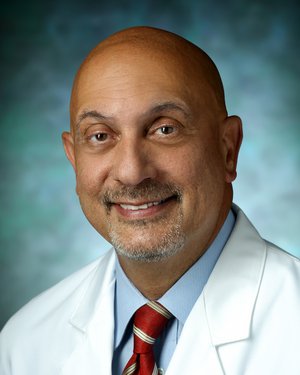Research Lab Results
-
Steve Cohen Lab
Research in the Steven Cohen Lab focuses on pain—including fibromyalgia and neuropathic pain—with many studies investigating the causes and treatment of injuries among U.S. soldiers related to these topics. -
Allan Gottschalk Lab
Research in the Allan Gottschalk Lab focuses on the mechanisms behind neuropathic pain, chronic pain related to nerve injury. We are investigating biophysical models of the impact of general anesthesia on the central nervous system; informational aspects of sensory perception and the representation of sensory input; nonlinear dynamics of respiratory pattern generation; and acute perioperative pain.
Principal Investigator
Department
-
Roger Johns Lab
Investigators in the Roger Johns Lab are examining the molecular mechanisms behind the onset and continuation of chronic pain, particularly neuropathic pain. This work has led to a better understanding of the vast network of molecules at neuronal synapses, particularly the postsynaptic density (PSD), which is key to the propagation of pain signals. We're working to develop new analgesics that interfere with the PSD protein interactions in an effort to better treat patients who suffer from chronic pain.
-
Kayode Williams Lab
The Kayode Williams Lab conducts translational research on neuromodulation. We primarily examine the mechanisms and efficacy of spinal cord stimulation in treating neuropathic pain, peripheral neuropathies and peripheral vascular disease. Our clinical trials explore spinal cord stimulation in the treatment of painful diabetic neuropathy and the treatment of critical non-reconstructible critical leg ischemia. We also have a longstanding interest in the business of medicine and seek to enhance value propositions for hospitals and physician groups through more effective management of resources.
-
Sivanesan Neuromodulation Laboratory (SNL)
Work in the Sivanesan Neuromodulation Laboratory (SNL) focuses on developing electrical stimulation therapies for treating neuropathic pain conditions and discovering novel applications for patients suffering from painful conditions. We study mechanisms of all modalities of spinal cord stimulation in the laboratory and aim to rapidly translate these discoveries to patient care. This bench to bedside approach facilitates a unique integration of the latest science with the clinical care of patients.
-
Michael Caterina Lab
The Caterina lab is focused on dissecting mechanisms underlying acute and chronic pain sensation. We use a wide range of approaches, including mouse genetics, imaging, electrophysiology, behavior, cell culture, biochemistry and neuroanatomy to tease apart the molecular and cellular contributors to pathological pain sensation. A few of the current projects in the lab focus on defining the roles of specific subpopulations of neuronal and non-neuronal cells to pain sensation, defining the role of RNA binding proteins in the development and maintenance of neuropathic pain, and understanding how rare skin diseases known as palmoplantar keratodermas lead to severe pain in the hands and feet.
-
Machine Biointerface Lab
Dr. Fridman's research group invents and develops bioelectronics for Neuroengineering and Medical Instrumentation applications. We develop innovative medical technology and we also conduct the necessary biological studies to understand how the technology could be effective and safe for people. Our lab is currently focused on developing the ""Safe Direct Current Stimulation"" technology, or SDCS. Unlike the currently available commercial neural prosthetic devices, such as cochlear implants, pacemakers, or Parkinson's deep brain stimulators that can only excite neurons, SDCS can excite, inhibit, and even sensitize them to input. This new technology opens a door to a wide range of applications that we are currently exploring along with device development: e.g. peripheral nerve stimulation for suppressing neuropathic pain, vestibular nerve stimulation to correct balance disorders, vagal nerve stimulation to suppress an asthma attack, and a host of other neuroprosthetic applications. Medical Instrumentation MouthLab is a ""tricorder"" device that we invented here in the Machine Biointerface Lab. The device currently obtains all vital signs within 60s: Pulse rate, breathing rate, temperature, blood pressure, blood oxygen saturation, electrocardiogram, and FEV1 (lung function) measurement. Because the device is in the mouth, it has access to saliva and to breath and we are focused now on expanding its capability to obtaining measures of dehydration and biomarkers that could be indicative of a wide range of internal disorders ranging from stress to kidney failure and even lung cancer.

